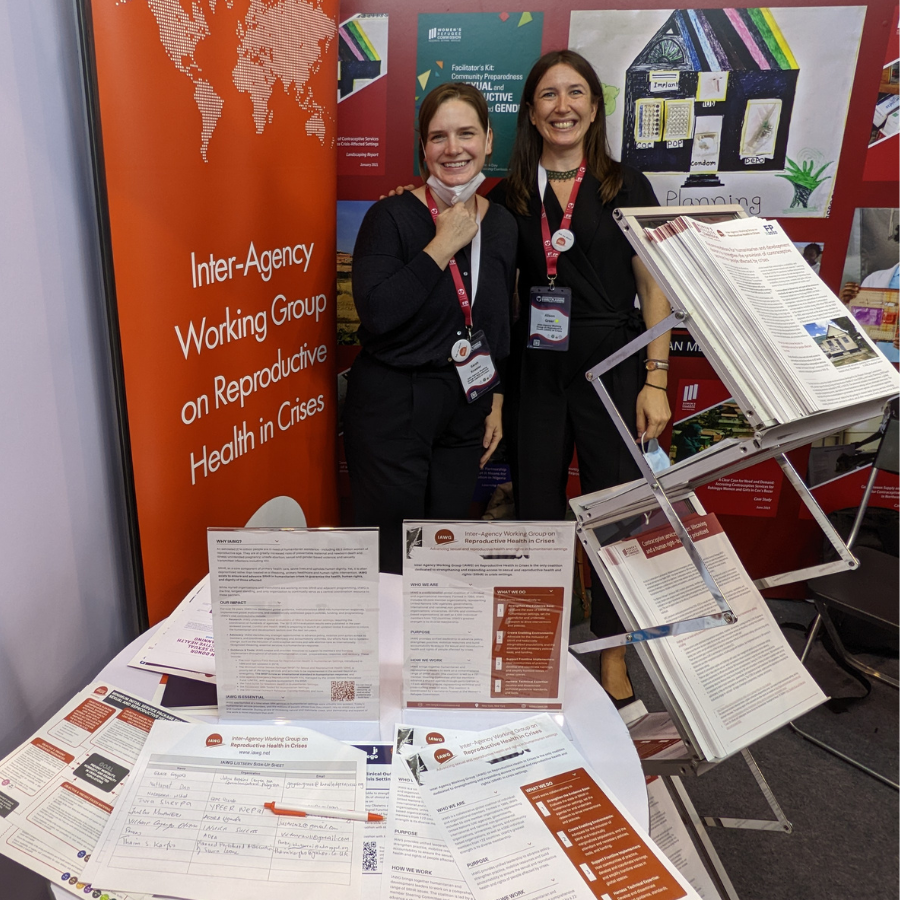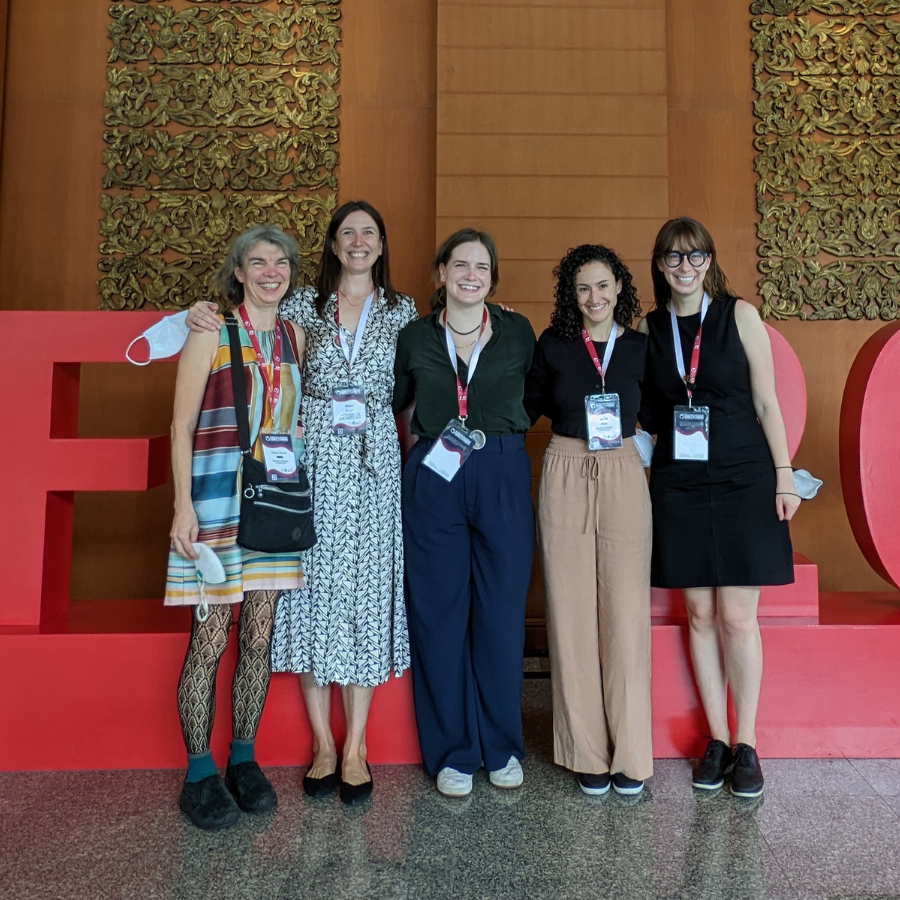 In a conflict or a crisis, women and girls who are forced to flee their homes often lack basic resources and services. This includes limited access to sexual and reproductive health care and services for refugee women and girls. The Inter-Agency Working Group on Reproductive Health in Crises (IAWG) is a coalition, housed at the Women’s Refugee Commission, working to improve access to sexual and reproductive health care in crisis settings globally. We talked with Sarah Knaster, who leads IAWG’s work, about issues facing displaced women and girls and their reproductive rights, along with how to help them.
In a conflict or a crisis, women and girls who are forced to flee their homes often lack basic resources and services. This includes limited access to sexual and reproductive health care and services for refugee women and girls. The Inter-Agency Working Group on Reproductive Health in Crises (IAWG) is a coalition, housed at the Women’s Refugee Commission, working to improve access to sexual and reproductive health care in crisis settings globally. We talked with Sarah Knaster, who leads IAWG’s work, about issues facing displaced women and girls and their reproductive rights, along with how to help them.
Tell us a bit about IAWG, its work, and the populations it serves.
IAWG stands for the Inter-Agency Working Group on Reproductive Health in Crises. It’s an international coalition of organizations and individuals. There are representatives from United Nations agencies, governments, international and national nongovernmental organizations, universities, donors, and community-based organizations, as well as over 4,000 individuals. Together, we’re working to advance sexual and reproductive health and rights (SRHR) in humanitarian settings.

For nearly three decades, IAWG has worked collectively to accomplish three things: one, to support the agencies and individuals working in crisis settings with technical expertise, tools, and guidance that they need to implement quality sexual and reproductive health services; two, to conduct research to better understand what’s working well and where there are gaps and challenges for displaced people and those who serve them; and three, to advocate for better policies, tools, and funding to support sexual and reproductive health and rights.
IAWG’s work is driven by and for those who are responsible for providing sexual and reproductive health services to people affected by crises. Our goal is to ensure that quality sexual and reproductive health services are included in every single humanitarian response, from the very beginning.
What are some of the challenges displaced women and girls face in meeting their basic sexual and reproductive health needs?
Women and girls bear the brunt of war and forced displacement. They face unique health and protection challenges. When sexual and reproductive health is neglected in humanitarian settings, the consequences are serious—and even deadly. More than half of maternal deaths globally occur in areas affected by conflict or natural disasters and countries with these crises have the highest levels of preventable newborn deaths. Refugee women and girls are at increased risk of sexual violence and its consequences, such as unintended pregnancies and unsafe abortions, sexually transmitted infections, including HIV, and ongoing mental health problems.
Thanks in large part to IAWG’s decades of advocacy, SRHR is now recognized as an essential lifesaving component of primary healthcare by the most influential standard-setting bodies, including the World Health Organization. Despite this, SRHR is frequently politicized or seen as “extra” or “optional” by implementers of humanitarian response. This sidelining of, or outright hostility toward, SRHR means these lifesaving services are in perpetual danger of being further deprioritized or siloed from other health and protection services. This can result in restrictive policies, lack of funding, lack of awareness from key decision-makers, or lack of capacity to implement services.
I always find a concrete example to be a sobering reminder of what’s really at stake. In Gaza, UNFPA (the United Nations sexual and reproductive health agency) has estimated 50,000 women were pregnant a month after the current Israel-Gaza conflict erupted on October 7, 2023. Globally,15 percent of pregnant women will develop a potentially life-threatening complication that will require a significant intervention to save the life of the woman, while 20 percent of newborns will require a lifesaving medical intervention. If these numbers are similar in Gaza, an estimated 7,500 women and 10,000 newborns are at risk of death in Gaza from entirely preventable causes if they do not have access to lifesaving reproductive health care.
What do you find most inspiring in your work with IAWG advocating for sexual and reproductive health and rights?

Hands down the most inspiring part of my work is witnessing the passion and dedication of our members and the diversity and depth of knowledge and experience they bring to their coalition work. IAWG boasts a deeply committed membership that believes systemic improvement happens when coordination occurs across organizations, sectors, phases of the humanitarian cycle, and from local to global levels. It’s truly inspiring to see so many people apply their unique expertise, experiences, and creativity to a shared vision. And they do so on a largely volunteer basis. I feel so honored to be a part of it.
In 2024, nearly 300 million people around the world will need humanitarian assistance and protection. Climate change, increases in violent conflict, and the impact of infectious diseases continue to significantly expand humanitarian needs. Meanwhile, in 2023, less than 40% of funding needs were met, the widest ever gap between the needs and available funding. There is more need than ever before to coordinate approaches, maximize resources, and reduce duplications and inefficiencies.
This is a daunting situation. But working alongside such dedicated IAWG partners, I feel motivated. We’re harnessing the collective knowledge, skills, and expertise of our worldwide members to not only ensure that decades of hard-won progress won’t be rolled back but to also to keep advancing our shared vision: a world where the rights to health and human dignity are promoted and protected, without exception, for all those affected by humanitarian crises.
How can our readers help refugee women and girls with their sexual and reproductive health rights?
One way to help is to advocate for policies that protect and support sexual and reproductive health and rights. For example, people in the United States looking to get involved can reach out to their representatives in Washington about the Global Health, Empowerment, and Rights Act (known as the Global HER Act). This act would prevent a future US president from unilaterally imposing the global gag rule, which prevents foreign organizations receiving US global health assistance from providing information or services for legal abortion or advocating for abortion access. A simple message to your representative about your support for this act could go a long way.
We also need funding for this critical work. Donations to organizations like the Women’s Refugee Commission, which currently hosts the IAWG secretariat, can help advance their research and advocacy work, which includes SRHR. Learn more about IAWG’s members and how to support their work on SRHR in humanitarian settings. We would also love you to visit IAWG’s website to learn more about how we work on behalf of refugee women and girls’ sexual and reproductive health care and rights.

